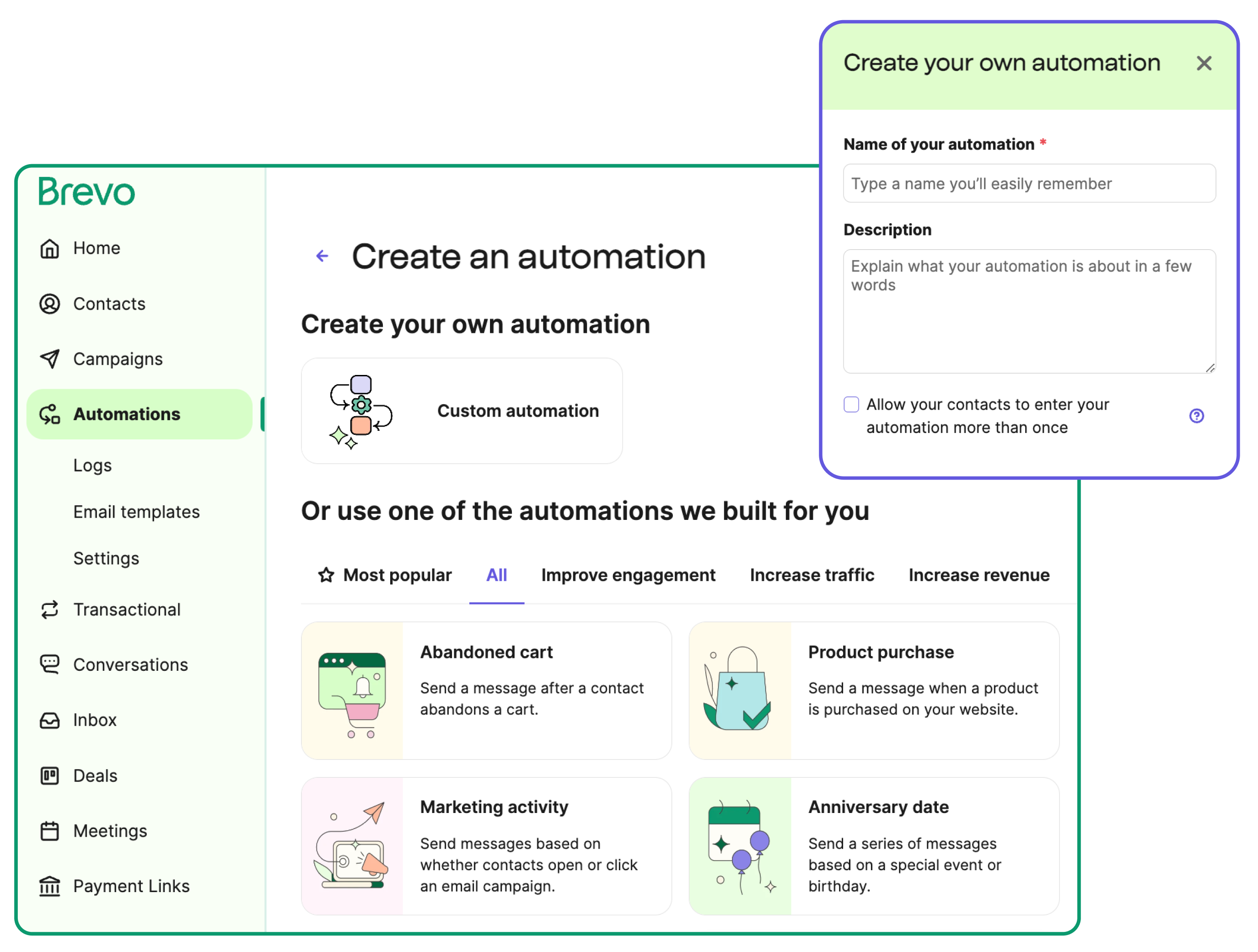Alternatives to ActiveCampaign
1. Brevo
+Pros
- Unified multichannel platform combining email, SMS, WhatsApp, and live chat capabilities.
- Volume-based pricing model with 300 emails daily and unlimited contacts up to 100,000 on the free tier.
- GDPR compliance capabilities and secure data handling validated through the Doctolib healthcare partnership.
- Aura AI assistant operates within existing workflow tools rather than requiring separate interfaces.
-Cons
- Klaviyo offers deeper native Shopify revenue attribution and more sophisticated predictive analytics capabilities.
- Mailchimp provides broader third-party integration ecosystem and more extensive template libraries.
- Users report varying performance across email providers with Gmail presenting particular difficulties.
- Integration with legacy systems presents challenges.
One highlighted feature and why it's amazing
Brevo integrates email, SMS, WhatsApp, and live chat capabilities under a single interface, eliminating tool fragmentation that typically requires multiple vendor relationships and separate training investments.

Another highlighted feature of why it’s amazing
The platform's core AI functionality centers on Aura, launched in 2025 following significant platform investment, providing content generation for subject lines, email copy, and CTAs with brand tone adjustment capabilities.
2. Drip
+Pros
- Behavioral Segmentation Excellence
- Ecommerce-Specific Architecture
- Proven Revenue Impact
- Implementation Efficiency
-Cons
- Generative AI Capabilities Gap
- Market Scope Constraints
- Enterprise Implementation Complexity
- SMS Integration Challenges
One highlighted feature and why it's amazing
Automatically updates audience segments based on real-time customer behavior, enabling dynamic targeting without manual intervention.

Another highlighted feature of why it’s amazing
Analyzes individual open-rate patterns to determine optimal delivery times for each subscriber.
3. SAP Emarsys
+Pros
- Unified Platform Architecture eliminates complexity of multi-vendor AI implementations
- Rapid Deployment Capabilities through 20+ pre-built AI tactics
- Enterprise-Grade Stability demonstrated through consistent analyst recognition
- Proven Customer Success with measurable outcomes
-Cons
- Commercial Transparency Challenges with specific pricing details not readily accessible
- Implementation Complexity Variation with deeper use cases presenting challenges
- Potential Ecosystem Dependencies within the SAP environment
- Competitive Limitations include less experimentation sophistication versus Optimizely
One highlighted feature and why it's amazing
Delivers sophisticated customer engagement through 20+ pre-built AI tactics that enable rapid deployment of advanced campaigns including abandoned browse recovery and post-purchase cross-selling .

Another highlighted feature of why it’s amazing
Eliminates integration complexity by consolidating customer data management, marketing automation, and personalization capabilities within a single environment .
Other Alternatives
HubSpot AI Content Assistant
Klaviyo
Mailchimp
Omnisend
Sendlane
Sendlane
How We Researched This Guide
About This Guide: This comprehensive analysis is based on extensive competitive intelligence and real-world implementation data from leading AI vendors. StayModern updates this guide quarterly to reflect market developments and vendor performance changes.
276+ verified sources per analysis including official documentation, customer reviews, analyst reports, and industry publications.
- • Vendor documentation & whitepapers
- • Customer testimonials & case studies
- • Third-party analyst assessments
- • Industry benchmarking reports
Standardized assessment framework across 8 key dimensions for objective comparison.
- • Technology capabilities & architecture
- • Market position & customer evidence
- • Implementation experience & support
- • Pricing value & competitive position
Research is refreshed every 90 days to capture market changes and new vendor capabilities.
- • New product releases & features
- • Market positioning changes
- • Customer feedback integration
- • Competitive landscape shifts
Every claim is source-linked with direct citations to original materials for verification.
- • Clickable citation links
- • Original source attribution
- • Date stamps for currency
- • Quality score validation
Analysis follows systematic research protocols with consistent evaluation frameworks.
- • Standardized assessment criteria
- • Multi-source verification process
- • Consistent evaluation methodology
- • Quality assurance protocols
Buyer-focused analysis with transparent methodology and factual accuracy commitment.
- • Objective comparative analysis
- • Transparent research methodology
- • Factual accuracy commitment
- • Continuous quality improvement
Quality Commitment: If you find any inaccuracies in our analysis on this page, please contact us at research@staymodern.ai. We're committed to maintaining the highest standards of research integrity and will investigate and correct any issues promptly.